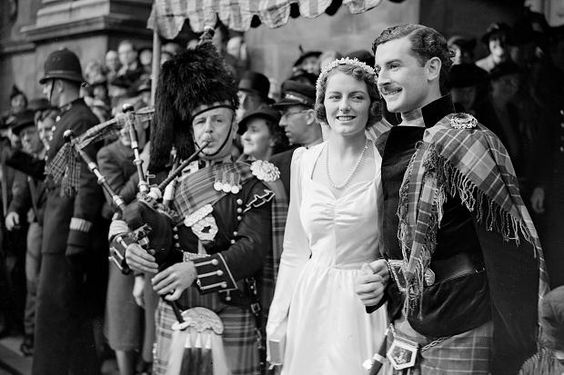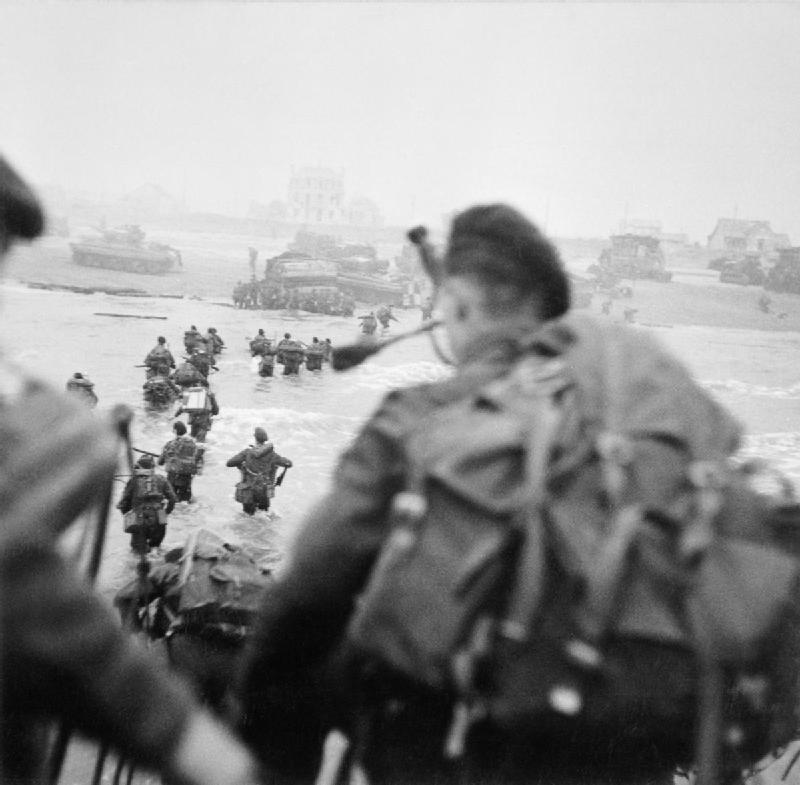Brigadier Simon Fraser, 17th Lord Lovat, DSO, MC, TD, JP, DL was the 24th Chief of the Clan Fraser of Lovat and a prominent British Commando during the Second World War. His friends called him Shimi Lovat, an anglicised version of his name in the Scottish Gaelic language. His clan referred to him as MacShimidh, his Gaelic patronym, meaning Son of Simon. While the 15th Lord de jure, he was the 17th Lord Lovat de facto, but for the attainder of his Jacobite ancestor who was executed in 1747.
Early life
Shimi was the son of the 16th Lord Lovat, and Laura, daughter of Thomas Lister, 4th Baron Ribblesdale. After being educated at Ampleforth College and Magdalen College, Oxford University, where he joined the University’s Cavalry Squadron, Fraser was commissioned as a second lieutenant in the Lovat Scouts (a Territorial Army unit) in 1930. He transferred to the regular army, while still a second lieutenant joining the Scots Guards in 1931. The following year, Fraser succeeded his father to become the 17th Lord Lovat and 24th Chief of the Clan Fraser. He was promoted lieutenant in August 1934, and in 1938 married Rosamond Broughton (1917-2012), the daughter of Sir Henry John Delves Broughton with whom he had six children.

Shimi and Rosie on their wedding day, 1938
World War II
In June 1939, just months before the Second World War, Lord Lovat also resigned his reserve commission. In July, however, as war approached, he was mobilized as a captain in the Lovat Scouts. The following year, he volunteered to join one of the new commando units being formed by the British Army, and was eventually attached to No. 4 Commando. On 3 March 1941, Nos 3 and 4 Commando launched a raid on the German-occupied Lofoten Islands. In the successful raid, the commandos destroyed fish-oil factories, petrol dumps, and 11 ships. They also seized encryption equipment and codebooks. As well, the commandos captured 216 German troops; 315 Norwegians chose to accompany the commandos back to Britain.
As a temporary major, Lord Lovat commanded 100 men of No. 4 Commando and a 50-man detachment from the Canadian Carleton and York Regiment in a raid on the French coastal village of Hardelot in April. For this action he was awarded the Military Cross on 7 July 1942. Lord Lovat became an acting lieutenant-colonel in 1942 and was appointed the commanding officer of No. 4 Commando, leading them in a successful component of the abortive Dieppe Raid (Operation Jubilee) on 19 August. His commando attacked and destroyed a battery of six 150 mm guns. Lovat was awarded the Distinguished Service Order (DSO).
The Dieppe Raid of 1942 was a disastrous failure with over 4,000 casualties sustained, predominantly Canadian. Yet No. 4 Commando executed its assault, with most men returning safely to Britain.
Lord Lovat eventually became a brigadier and became the commander of the newly formed 1st Special Service Brigade in 1944. Lord Lovat’s brigade was landed at Sword during the invasion of Normandy on 6 June 1944. Lord Lovat reputedly waded ashore wearing a white jumper under his battledress, with “Lovat” inscribed into the collar, while armed with a .45-70 Winchester underlever rifle. (The latter claim has not been verified and is disputed; however, in some earlier pictures y/1942 he is seen with a bolt-action .30-06 Winchester M70 sporting rifle). However, in his memoirs, Lovat states that he was armed with a “short barreled U.S. Army carbine” on D-Day.
Lord Lovat instructed his personal piper, Bill Millin, to pipe the commandos ashore, in defiance of specific orders not to allow such an action in battle. When Private Millin demurred, citing the regulations, he recalled later, Lord Lovat replied: “Ah, but that’s the English War Office. You and I are both Scottish, and that doesn’t apply.”

Lovat and piper Millen landing on Sword Beach
Lovat’s forces swiftly pressed on, Lovat himself advancing with parts of his brigade from Sword to Pegasus Bridge, which had been defiantly defended by men of the 2nd Bn the Ox & Bucks Light Infantry (6th Airborne Division) who had landed in the early hours by glider. Lord Lovat’s commandos arrived at a little past 1 p.m. at Pegasus Bridge though the rendezvous time as per the plan was noon. It is a common misconception that they reached almost exactly on time, late by only two and a half minutes. Upon reaching the rendezvous, Lord Lovat apologised to Lieutenant-Colonel Geoffrey Pine-Coffin, of 7th Parachute Battalion. He went on to establish defensive positions around Ranville, east of the River Orne. The bridges were relieved later in the day by elements of the British 3rd Infantry Division.
During the Battle of Breville on 12 June, Lord Lovat was seriously wounded whilst observing an artillery bombardment by the 51st Highland Division. A stray shell fell short of its target and landed amongst the officers, killing Lieutenant-Colonel A. P. Johnston, commanding officer of the 12th Parachute Battalion, also seriously wounding Brigadier Hugh Kindersley of the 6th Airlanding Brigade. By a grateful French Fourth Republic, he was awarded the Légion d’honneur and the Croix de Guerre.
Later life
Lord Lovat was a stalwart of the Inverness highlands aristocracy. In 1942 he was appointed a Deputy Lieutenant of the county, and two years later a JP. Lord Lovat made a full recovery from the severe wounds he had received in France but was unable to return to the army (he transferred to the reserve in 1949). Winston Churchill requested that he become Captain of the Honourable Corps of Gentlemen-at-Arms in the House of Lords; however, Lord Lovat declined the offer and in 1945 joined the Government as Parliamentary Under-Secretary of State for Foreign Affairs, “becoming responsible for the functions of the Ministry of Economic Warfare when these were taken over by the Foreign Office”, resigning upon Winston Churchill’s election defeat. In 1946 he was made a Commander of the Venerable Order of Saint John. His formal retirement from the army came on 16 June 1962, he retained the honorary rank of brigadier.
Lord Lovat’s involvement in politics continued throughout his life, in the House of Lords and the Inverness County Council for the next forty-two years. He also devoted much of his time to the family estates of 250,000 acres in the highlands. He was chieftain of Lovat Shinty Club, the local shinty team which bears his family name. Lord Lovat experienced a great deal of turmoil in his final years; he suffered financial ruin and two of his sons predeceased him in accidents within months of each other. In 1994, a year before his death, the family’s traditional residence, Beaufort Castle, was sold.
Source: Wikipedia